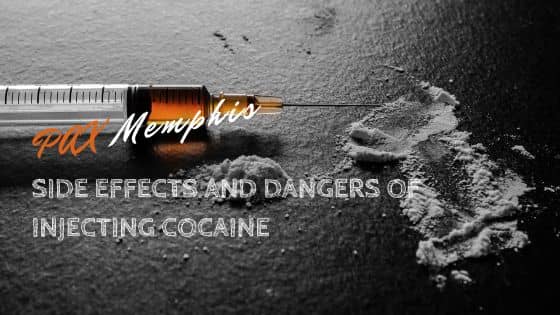Cocaine is a highly potent stimulant drug that is known to be extremely addictive. Many people abuse cocaine to experience a euphoric and energetic high that can cause feelings of invincibility and impulsive behaviors.
According to the National Institute of Drug Abuse (NIDA), “Among people aged 12 or older in 2021, 1.7% (or about 4.8 million people) reported using cocaine in the past 12 months.”[1]
Cocaine is bought illegally from drug dealers and is a white powdery substance. Because cocaine comes in powder, most people snort the drug. However, some individuals may begin to inject it once they develop a tolerance.
While any form of cocaine abuse is dangerous, injecting it can increase the likelihood of negative effects. If you or someone you love are injecting cocaine, please contact PAX Memphis Recovery today to discuss your treatment options with an admissions counselor.
Why Do People Inject Cocaine?
The main reason someone would begin injecting cocaine is to experience a more powerful high. Shooting up cocaine delivers it directly into a person’s bloodstream, and the effects take place almost instantaneously and at a more significant level. However, there are many reasons someone may inject the substance.
The reasons someone might begin injecting cocaine include:
- To enhance the effects of cocaine
- To save money, as it requires less cocaine to experience a high when injecting
- To overcome a tolerance they developed by using the drug in a more potent form
- As a manner of experimenting with cocaine to see how different methods of administration affect them (in other words, out of curiosity)
If you or a loved one inject cocaine, you must understand the dangers associated with this method of administration. While injecting the substance might produce a faster and more intense high, it also increases your risk of serious health problems, addiction, and even fatal overdoses.
Side Effects of Injecting Cocaine
When you abuse cocaine, you might feel an increase in energy, a rush of euphoria, and feelings of invincibility or self-importance. However, abusing this substance can also lead to negative side effects like anxiety or paranoia. When you are injecting cocaine, these side effects become more intense than if you were to snort the drug.
Potential side effects of injecting cocaine include:[2]
- Increased heart rate and blood pressure
- Respiratory problems like shortness of breath, chest pain, or damage to the lungs
- Nausea and vomiting
- Dehydration
- Life-threatening seizures and brain damage
- Anxiety, panic, or paranoia
- Aggressive behavior
- Addiction
Risks and Dangers of IV Cocaine Abuse
When you are injecting cocaine, the effects are more potent than if you snorted the drug. While this may seem appealing, it can increase your risk of several adverse effects.
Overdose
Shooting up cocaine increases the risk of overdose. Symptoms of a cocaine overdose include:[3]
- Increased body temperature and sweating
- Increased heart rate
- Chest pain that radiates to the shoulder and arm (symptoms of a heart attack)
- Difficulty breathing
- Rapid or slowed breathing
- A bluish tint of the skin
- Nausea and vomiting
- Seizures or strokes
- Tremors
- Loss of consciousness
- Delirium
- Hallucinations
Cocaine overdoses should always be treated by emergency medical services. Without treatment, an overdose could become fatal.
Infections and Blood-Borne Diseases
Injecting any drug can increase your risk of experiencing abscesses, skin infections, and cellulitis. Additionally, if you begin to share your needles with other people you are at a serious risk of contracting blood-borne diseases like hepatitis or HIV.
According to the CDC, 1 in 10 new HIV diagnoses are contributed to injection drug use.[4]
Injection can also lead to abscesses on the skin, skin infections, collapsed veins, poor circulation, and damage to the cardiovascular system.
Heart Complications
Shooting up cocaine increases the risk of life-threatening heart complications like heart attacks and strokes.
For example, cocaine use is linked to increased risk of:[5]
- Arrhythmias
- Acute myocardial infarction
- Cardiomyopathy
- Coronary artery disease
- Cocaine-induced cardiotoxicity that leads to sudden death
- Hypertension
All of these cardiovascular conditions must be treated by a professional, as they can result in life-threatening effects. As a result, anyone who engages in IV cocaine abuse should seek professional drug rehab.
Find Help for IV Cocaine Abuse and Addiction
If you or a loved one are addicted to cocaine, it’s time to seek professional help. While any type of cocaine abuse is dangerous, injecting the substance can cause you to experience adverse effects at a faster rate. Thankfully, PAX Memphis is here to help you find a cocaine rehab center that suits your specific needs.
To learn more about how we can help you find treatment for IV cocaine abuse, contact PAX Memphis today.
References:
- The National Institute of Drug Abuse (NIDA): What is the scope of cocaine use in the United States, Retrieved July 2023 From https://nida.nih.gov/publications/research-reports/cocaine/what-scope-cocaine-use-in-united-states
- The National Institute of Drug Abuse (NIDA): What are the short-term effects of cocaine use, Retrieved July 2023 From https://nida.nih.gov/publications/research-reports/cocaine/what-are-short-term-effects-cocaine-use
- The National Library of Medicine (NLM): Cocaine Toxicity, Retrieved July 2023 From https://www.ncbi.nlm.nih.gov/books/NBK430976/
- The Centers for Disease Control and Prevention (CDC): HIV and Injection Drug Use, Retrieved July 2023 From https://www.cdc.gov/hiv/basics/hiv-transmission/injection-drug-use.html
- The National Library of Medicine (NLM): Acute and Chronic Effects of Cocaine on Cardiovascular Health, Retrieved July 2023 From https://www.ncbi.nlm.nih.gov/pmc/articles/PMC6387265/
Medically Reviewed: September 25, 2019

All of the information on this page has been reviewed and verified by a certified addiction professional.










